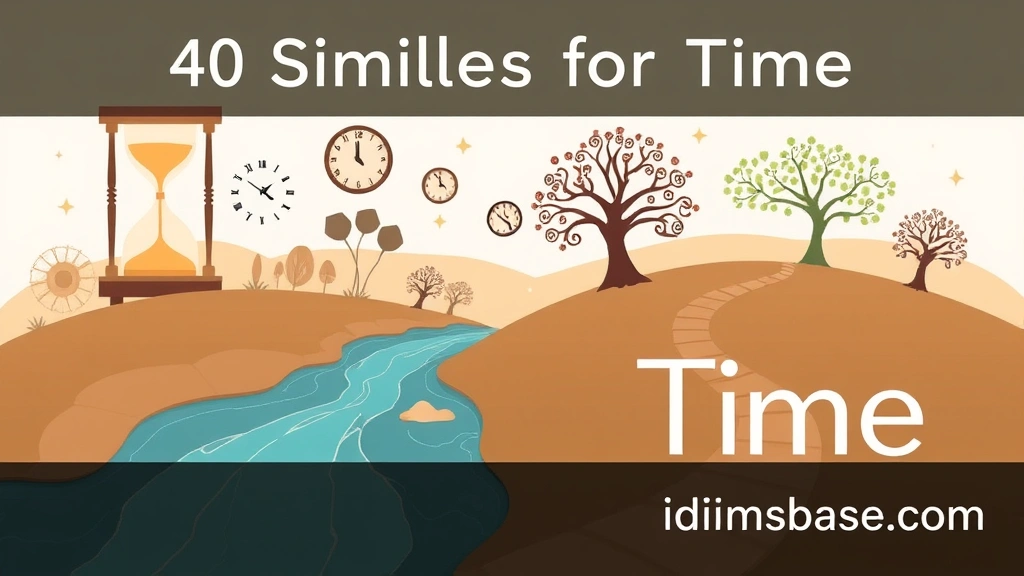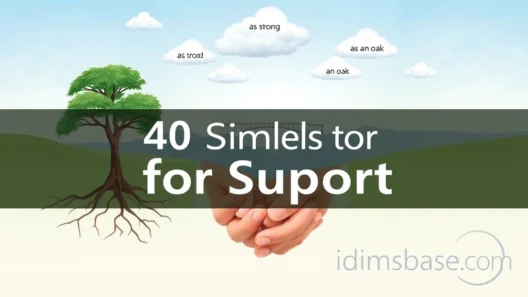Time, oh time! It's one of those fascinating things that we all experience, yet often struggle to describe. How do you capture something so fleeting, so powerful, and so constant all at once? We often turn to similes – those wonderful comparisons that use "like" or "as" – to help us articulate its elusive nature.
Have you ever found yourself saying, "Time flies," or "It feels like forever"? You're already using similes! They help us paint vivid pictures with words, making abstract concepts like time tangible and relatable. Get ready to dive into a treasure trove of imaginative comparisons that will change the way you think and talk about time.
The Dance of Time: Similes that Capture its Movement
Time is rarely still. It rushes, it crawls, it dances, and it waits. These similes capture the dynamic ways time moves through our lives.
- Time is like a river: Always flowing, never stopping, constantly moving forward. It’s a classic for a reason!
- Time is like a runaway train: Unstoppable, fast, and powerful, carrying you along whether you're ready or not.
- Time is like a fleeting shadow: Here one moment, gone the next, hard to grasp.
- Time passes like a dream: Hazy, sometimes vivid, often hard to recall the details once it's over.
- Time moves as swiftly as an arrow: Direct, focused, and incredibly fast once released.
- Time crawls like a snail: Slow, deliberate, and sometimes frustratingly unhurried.
- Time stretches like a rubber band: Seemingly endless when you're bored, but snapping back quickly when you're busy.
- Time disappears like smoke: Vanishing into thin air, leaving no trace.
- Time bounces like a rubber ball: Sometimes fast, sometimes slow, often unpredictable in its trajectory.
- Time spins like a top: Whirling rapidly, creating a blur that's hard to focus on.
The Essence of Time: Similes that Describe its Nature
Beyond movement, what is time? Is it a healer, a destroyer, a teacher? These similes delve into the fundamental qualities we attribute to time.
- Time is like a thief in the night: Stealing moments, youth, and opportunities without you even realizing it until it's too late.
- Time is like a gentle healer: Mending wounds, softening pain, and bringing perspective over time.
- Time is as precious as gold: Invaluable, finite, and something we often wish we had more of.
- Time is like a relentless tide: Constantly coming in and going out, shaping the shore, eroding and building.
- Time is like a blank canvas: Waiting for you to paint your experiences, memories, and future upon it.
- Time is like a strict teacher: Imparting lessons, sometimes harshly, always shaping our understanding.
- Time is as fragile as a bubble: Easily burst, once gone, it's gone forever.
- Time is like a quiet observer: Watching everything unfold, never interfering, just being.
- Time is like a key: Unlocking new opportunities, understanding, and stages of life.
- Time is as vast as the ocean: Stretching out in every direction, seemingly endless, full of hidden depths.

Time's Impact: Similes for its Effects
Time changes everything. It ages us, matures us, reveals truths, and brings about new beginnings. How do we describe these profound effects?
- Time ages you like fine wine: Improving, deepening, and gaining character with each passing year.
- Time erases memories like a chalkboard: Fading details, blurring edges, until some things are completely gone.
- Time reveals truths like a slow dawn: Gradually, gently, bringing clarity to what was once obscure.
- Time builds character like a sculptor: Chiseling away imperfections, shaping experiences into who you become.
- Time wears things down like water on stone: Slowly but surely eroding, changing, and smoothing surfaces.
- Time brings perspective like climbing a mountain: The higher you go, the more you see, and the smaller past worries appear.
- Time unfolds like a story: Each moment a new chapter, building on what came before, leading to the next.
- Time ripens opportunities like fruit: Allowing them to mature and become ready for harvest at just the right moment.
- Time changes opinions like the weather: Sometimes unpredictable, shifting with new information and experiences.
- Time strengthens bonds like roots of a tree: Growing deeper and more resilient with each passing season.
The Human Experience of Time: Similes for Our Feelings

Our relationship with time is deeply personal. We feel its weight, its lightness, its urgency, its endlessness. These similes touch on the subjective experience.
- Time feels like an eternity: When you're waiting for something important or enduring a difficult moment.
- Time flies like a bird: When you're having fun, busy, or deeply engaged in something you love.
- Time hangs heavy like a cloak: When you're bored, lonely, or feeling the burden of responsibilities.
- Time slips through your fingers like sand: No matter how tightly you try to hold on, it always escapes.
- Time is as elusive as a dream: Hard to grasp, difficult to pin down, often fading upon waking.
- Time is like a heartbeat: A constant rhythm, sometimes fast, sometimes slow, but always there.
- Time is as precious as a breath: Each one invaluable, sustaining life, and once exhaled, gone.
- Time is like a hungry monster: Always demanding more, consuming moments, days, and years.
- Time is like a wise old friend: Offering comfort, lessons, and a steady presence through life's ups and downs.
- Time is like a mirror: Reflecting your past, present, and the potential of your future.
Frequently Asked Questions (FAQ)
What is a simile?
A simile is a figure of speech that directly compares two different things using the words "like" or "as" to make the description more vivid and imaginative. For example, saying "The clouds were as fluffy as cotton" is a simile.

Why do we use similes for time?
Time is an abstract concept, meaning it's not something you can physically touch or see. Similes help us understand and describe abstract ideas by comparing them to concrete, familiar things. This makes time more relatable and easier to talk about in a meaningful way.
How can using similes improve my writing?
Similes add color, imagery, and depth to your writing. They help readers visualize what you're describing, make your language more engaging, and can convey complex ideas in a simple, impactful way. They also show creativity and a strong command of language.
Are there any common pitfalls when using similes?
Yes, a few! Avoid using clichés too often (unless intentionally for effect), make sure your comparison makes sense and isn't too obscure, and don't overuse them. Too many similes can make your writing feel cluttered or forced. The best similes feel natural and insightful.
Can similes be used in everyday conversation?
Absolutely! We use similes all the time without even realizing it. Phrases like "sleeping like a log," "eating like a bird," or "strong as an ox" are all common similes that make our daily conversations more expressive and fun.
Key Takeaways
- Similes make the abstract concrete: Time is hard to grasp, but comparing it to a river or a thief helps us understand its nature and impact.
- They add depth and emotion: Whether time feels like an eternity or flies like a bird, similes capture our subjective experience.
- Enhance communication: Using vivid comparisons makes your language more engaging, memorable, and easier for others to relate to.
- Unleash creativity: Thinking of new and unexpected similes for time (or anything else!) is a fantastic way to boost your creative muscles.
- Time is a multifaceted concept: There's no single perfect simile for time because it behaves and feels differently depending on the context. That's why having a rich vocabulary of comparisons is so useful!
So, the next time you're trying to describe that elusive thing we call time, remember this list! You've got a whole new arsenal of vivid, engaging ways to express its wonders. Which simile resonated most with you? Or do you have a favorite simile for time that wasn't on our list? Share your thoughts below – let's keep the conversation flowing, just like time itself!






